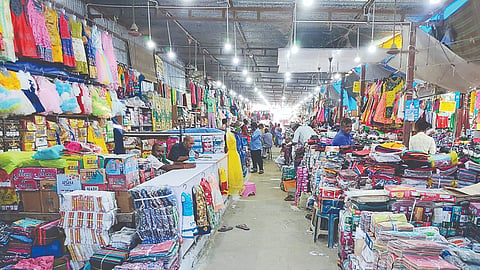

COIMBATORE: A whopping over Rs 500 crore worth textiles were stagnated in Erode, a popular textile hub in Tamil Nadu due to cash curbs in the poll-bound Erode East Assembly constituency.
Restrictions on carrying cash above Rs 50,000 without valid documents have brought the textile business to a complete standstill in the ever buzzing textile markets located in the constituency.
“There are nil sales in EKM Abdul Gani Textile Market (Gani Market), one of the biggest with around 720 weekly wholesale shops. The market would be buzzing with activity from Monday night to Tuesday afternoon. On an average, traders do business ranging between Rs 10 crore to Rs 15 crore, every week. But, the entire market remains deserted ever since the bypoll was announced,” said K Selvaraj, president of Erode Gani Market Weekly All Textile Merchants Association.
Merchants from other districts as well as Kerala, Karnataka and Andhra Pradesh, who throng the Gani Market for their wholesale purchases, have stopped coming to avoid the risk of checks and seizures by election authorities.
Even retail sales in regular shops in the market have been severely affected. This apart, there are thousands of textile shops selling textile goods at Ashokapuram, Eswaran Kovil Street and near Central Theatre.
Lack of business, has in-turn hit a large number of small-scale textile manufacturers from Chennimalai in Erode, Edappadi and Ammapet in Salem, Pallipalayam, Vennandur and Komarapalayam in Namakkal, who rely on the market to sell their produce. Manufacturers bring ‘lungi’ from Pallipalayam, towel and ‘pattu veshti’ from Salem, vests and briefs from Tirupur. Besides, sarees and dress materials sourced from Gujarat, Calcutta and Bombay are sold in the market.
“Only five per cent of business happens through online transactions. Buyers generally prefer cash on purchase due to various factors and convenience. Though we raised the issue with the Election Commission to relax regulations for genuine textile traders, it didn’t serve any purpose,” said another trader.
The market turns out to be a source of livelihood for more than 5,000 textile manufacturers and 10,000 workers. The traders are now waiting desperately for the bypoll to get over so that they can resume normal business.
Visit news.dtnext.in to explore our interactive epaper!
Download the DT Next app for more exciting features!
Click here for iOS
Click here for Android